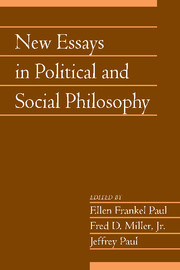Book contents
- Frontmatter
- Contents
- Introduction
- Acknowledgments
- Contributors
- Political Liberty: Who Needs It?
- State Coercion and Force
- Political Legitimacy and Economic Liberty
- Who Owns What? Some Reflections on the Foundation of Political Philosophy
- Human Reproductive Interests: Puzzles at the Periphery of the Property Paradigm
- Why Free Trade is Required by Justice
- Structural Exploitation
- Rescuing Justice from Equality
- Reinterpreting Rawls's The Law of Peoples
- Responsible Choices, Desert-Based Legal Institutions, and the Challenges of Contemporary Neuroscience
- Genocide and Crimes Against Humanity: Dispelling Some of the Conceptual Fog
- Harm and the Volenti Principle
- Education and the Modern State
- Index
Why Free Trade is Required by Justice
- Frontmatter
- Contents
- Introduction
- Acknowledgments
- Contributors
- Political Liberty: Who Needs It?
- State Coercion and Force
- Political Legitimacy and Economic Liberty
- Who Owns What? Some Reflections on the Foundation of Political Philosophy
- Human Reproductive Interests: Puzzles at the Periphery of the Property Paradigm
- Why Free Trade is Required by Justice
- Structural Exploitation
- Rescuing Justice from Equality
- Reinterpreting Rawls's The Law of Peoples
- Responsible Choices, Desert-Based Legal Institutions, and the Challenges of Contemporary Neuroscience
- Genocide and Crimes Against Humanity: Dispelling Some of the Conceptual Fog
- Harm and the Volenti Principle
- Education and the Modern State
- Index
Summary
Introduction
In this essay I argue that free trade is required by justice. Protectionist laws are indefensible on two grounds. First, they are indefensible in principle because they coercively redistribute resources in favor of persons who are not deserving beneficiaries under any plausible theory of domestic or international justice. Second, protectionist laws have objectionable consequences because they harm persons generally (they cause more harm than good), and they particularly tend to harm the poor. Resting on a robust consensus in the economic literature, I claim that liberalizing trade would contribute significantly to global and national growth and, mainly for that reason, would help in reducing poverty. An important corollary of my argument is that protectionist laws are indefensible, not just under a classical-liberal view of politics, but under any plausible moral-political theory.
Protectionist laws assume various forms: tariffs, import licenses, export licenses, import quotas, subsidies, government procurement rules, sanitary rules, voluntary export restraints, local content requirements, national security requirements, and embargoes. All these trade barriers, while different in a number of respects, have this in common: they raise the cost (sometimes prohibitively) of importing goods and services. Protectionist laws are artificial, coercive obstacles placed by governments on voluntary transactions across borders. Citizens, and especially the poor, are doubly harmed by trade barriers. On the one hand, protectionist barriers erected by governments of poor countries harm their own people.
- Type
- Chapter
- Information
- New Essays in Political and Social Philosophy , pp. 126 - 153Publisher: Cambridge University PressPrint publication year: 2013



